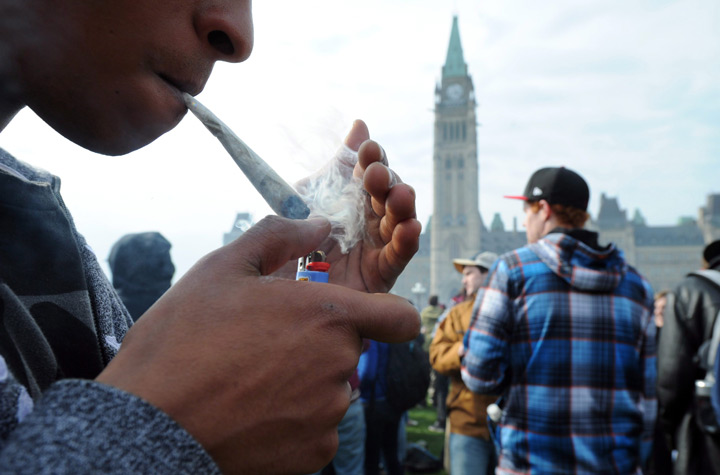In about ten months, a loophole will open in some of Canada’s smoking laws which will annoy some and delight others.

Over the last generation, governments at all levels across Canada have steadily restricted smoking tobacco.
B.C.’s Tobacco and Vapour Products Control Act does what it says on the label, as does Alberta’s Tobacco and Smoking Reduction Act, which begins by saying that ” … ‘smoke’ means to smoke, hold or otherwise have control over a lit tobacco product.”
Ontario’s Smoke-Free Ontario Act doesn’t deal with smoking anything other than tobacco (though a series of amendments, not yet in force, cover marijuana).
Local governments vary in their approach. Toronto’s smoking bylaw covers “… the carrying of a lighted cigar or cigarette, pipe or any other lighted material,” which could cover a joint if need be. Ottawa’s only refers to tobacco.
WATCH: Ontario Premier Kathleen Wynne and Quebec Premier Philippe Couillard said on Wednesday after the Council of the Federation meeting, both provinces are working towards having a similar framework when it comes to minimum age requirement for access to marijuana.

But the underlying assumption, which is that smoking marijuana doesn’t have to be dealt with in smoking laws because it’s illegal anyway, is about to be out of date. And without changes, there will be very few restrictions on where and when someone could smoke pot.
(The required changes aren’t necessarily that complicated: Manitoba’s Bill 25 amended the Non-Smokers Health Protection Act recently by, among other things, adding “or cannabis” after every mention of the word “tobacco.”)

“People tend to err on the more restrictive side. I get it, in that there’s no reason why cannabis legalization needs to infringe on other people’s enjoyment of space, other people who aren’t users.”“But if we’re not going to allow them to smoke in public spaces, which is okay, then we need to give them licenced spaces that they can smoke in, whether that be vapour lounges or other kinds of areas.”Colorado’s strict laws about public consumption are actively enforced, says Valleriani. Minor charges are rising.“A reason for that is that they’re so restrictive on where you can consume. I’d heard that people were getting tickets on their front porch.”One thing is clear: restriction of public marijuana use can’t extend beyond smoking and vaping. Trying to control where people consume cannabis edibles — cookies, popsicles, gummy bears — is hopeless.“You can’t regulate where people ingest edibles. It’s just not possible. We should look at situations where smoke might have the ability to infringe on other people’s rights.”


Comments